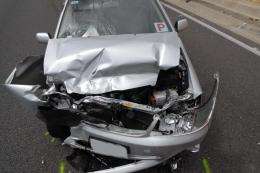Inexperience a key factor in youth crashes

(PhysOrg.com) -- A University of Adelaide (Australia) study has found that young drivers are twice as likely to have an accident during their first few months of driving on a provisional licence than after a year of driving experience.
Craig Kloeden from the University's Centre for Automotive Safety Research (CASR) says the high crash rates show that many newly-licensed young drivers are still too inexperienced to handle a vehicle safely.
"The study indicates that it is many hundreds of hours before young drivers become competent in a vehicle."
The current requirement for learners to gain their provisional licence in South Australia is 50 hours of driving, but this will soon be increased to 75.
"Given that young drivers are 15 times more likely to have an accident once they move from their learners to a provisional licence there is a strong case for extending the length of the learner phase even more," Mr Kloeden says.
In the study of 50,000 young drivers aged 16-19 over a five-year period, CASR also found that two types of crashes were commonplace among drivers in the first 12 months of gaining their P-plate: veering off the road and hitting fixed objects; and failing to correctly negotiate a right-hand turn across traffic.
"By the end of their first year of a provisional licence, these types of accidents were far less common," Mr Kloeden says. "It demonstrates that time spent behind the wheel is a very important determinant of crash risk."
While traffic offences related to driving skill (such as failing to indicate and give way) also decreased in the first year of a provisional licence, speed, alcohol and seat belt offences all increased among the young drivers.
"Giving our youth extended, supervised experience on the road and instilling in them safe driving behaviours early on are key factors to reducing the youth road toll," Mr Kloeden says.
"Raising the provisional licence age to 18 and having a maximum speed limit of 80 km/h during the first year of driving would also greatly reduce the number of youth crashes."
Provided by University of Adelaide (news : web)
















